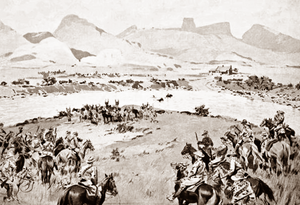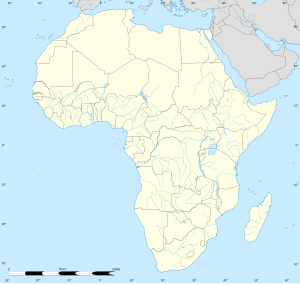
Back Maritz-rebellie Afrikaans تمرد ماريتز Arabic Maritz üsyanı Azerbaijani Rebel·lió Maritz Catalan Maritzoprøret Danish Maritz-Rebellion German Rebelión Maritz Spanish Rébellion Maritz French מרידת מאריץ HE Búr felkelés Hungarian
| Maritz rebellion | |||||||
|---|---|---|---|---|---|---|---|
| Part of the Boer Wars and the South West Africa Campaign of World War I | |||||||
 The Battle of Mushroom Valley, one of the most decisive battles in the Maritz Rebellion | |||||||
| |||||||
| Belligerents | |||||||
|
Supported by: | |||||||
| Commanders and leaders | |||||||
| Strength | |||||||
| 32,000 | 12,000 | ||||||
| Casualties and losses | |||||||
| 101+ killed and wounded |
124–190 killed 300 dead from illness 229–400 wounded[1] 1 executed | ||||||
The Maritz rebellion, also known as the Boer revolt, Third Boer War,[2] or the Five Shilling rebellion,[3] was an armed pro-German insurrection in South Africa in 1914, at the start of World War I. It was led by Boers who supported the re-establishment of the South African Republic in the Transvaal. Many members of the South African government were themselves Boers who had fought with the Maritz rebels against the British in the Second Boer War, which had ended twelve years earlier. The rebellion failed, with at least 124 out of 12,000 rebels killed in battle, another 300 dying during a retreat into the Kalahari Desert, and at least 229 wounded.[4] The surviving ringleaders received heavy fines and prison terms. One of them, Jopie Fourie, was executed.
- ^ Strachan, Hew (6 February 2003). The First World War: Volume I: To Arms – Hew Strachan – Google Books. OUP Oxford. ISBN 9780191608346. Retrieved 23 April 2016.
- ^ Dickens, Peter (13 August 2023). "Boer War 3 and beyond!". The Observation Post. Retrieved 22 August 2024.
- ^ General De Wet publicly unfurled the rebel banner in October, when he entered the town of Reitz at the head of an armed commando. He summoned all the town and demanded that the court shorthand writer take down every word he said, among which he complained: "I was charged before [the Magistrate of Reitz] for beating a native boy. I only did it with a small shepherd's whip, and for that I was fined 5/–". On hearing the contents of the speech, General Smuts christened the rising as "the Five Shilling Rebellion". (Plaatje 1916). Other sources place the incident in the town of Vrede on 28 October 1914 – see, for example, P.J. Sampson, The Capture of De Wet: the South African Rebellion, 1914 (1915), pp. 145-146.
- ^ "Afrikaner (Boer) Rebellion (Union of South Africa) / 1.0 / handbook". 1914-1918-Online (WW1) Encyclopedia. Retrieved 15 January 2025.


